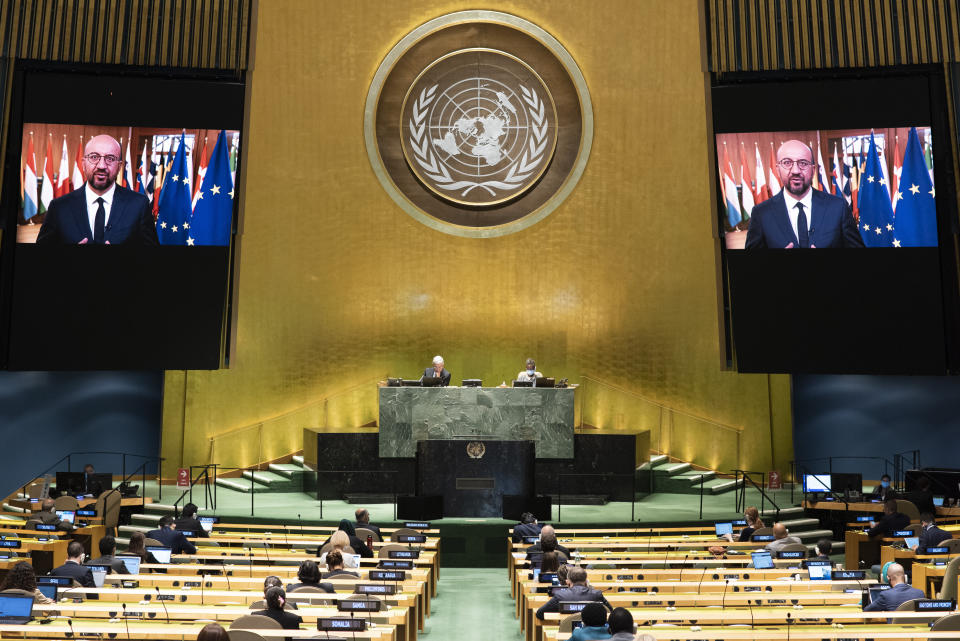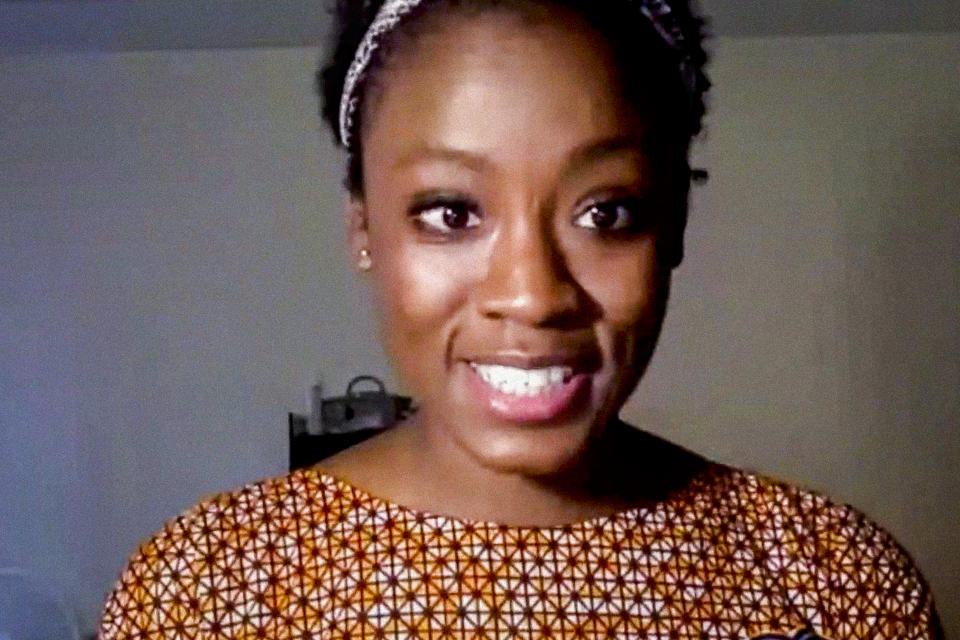Under virus strain, Europe's leaders plead at UN for unity
PARIS (AP) — Struggling to contain resurgent virus infections, European leaders decried a collective failure to vanquish the pandemic and told the U.N. General Assembly on Friday that the time has come for countries to reinvent international cooperation.
This year’s unusual work-from-home General Assembly — with leaders communicating only in prerecorded speeches — comes as COVID-19 cases escalate in many regions but especially in Europe, where some of the world's most advanced hospitals in some of the world’s richest countries are again under strain.
“This emergency has, more than a thousand treaties or speeches, made us suddenly realize that we are part of one single world,” said Spanish Prime Minister Pedro Sanchez.
The pandemic “has also revealed the fragility of countries that thought they were strong. It has thrown us all into the same sudden battle, against the same common enemy,” EU Council President Charles Michel said.
And it has exposed weaknesses within the European Union, which like the U.N. was founded on the ashes of World War II to avert new conflict and encourage cooperation — cooperation that was in short supply this year. The EU has fought internally about access to equipment and vaccines, erected barriers among neighbors to keep out virus infections, and struggled to agree on collective solutions to fight COVID.
Italy’s prime minister, whose country became a global symbol of the crisis as the first in the West to face a vast wave of infections, said the pandemic should offer world governments “the opportunity for collective renewal.”
“This tragedy has changed us, but has also offered us the opportunity for a new beginning that is up to us to seize," Giuseppe Conte said.
Worldwide, the confirmed COVID-19 death toll is nearing 1 million, though experts believe the real toll is likely higher. In times of global crisis, Europe’s rich governments are often looked to for financial and material aid for poorer ones. But this time, they’re preoccupied with troubles of their own.
As infections tick up, EU countries are again imposing quarantines on visitors from neighboring nations. Britain and Spain are imposing local lockdowns, the French Open is curtailing access, and COVID intensive care units in the Mediterranean city of Marseille are reaching saturation.
Meanwhile the pandemic has wrecked livelihoods and darkened the world's economic outlook, and damaged the whole concept of multilateralism that European leaders have long embraced.
“In every corner of the world today, there is a young man, a young woman, looking at their cell phone screen. In the most secluded streets of Naples, in a fish market in Instanbul, in the Zócalo in Mexico City, in the Ecuadorian Amazon or in a market in India. These young people have seen their fathers, their mothers, work ceaselessly,” Sanchez said. “And maybe these young people wonder why their fathers, their mothers, work ceaselessly if nothing changes around them.”
"Exactly when did we decide that the expression ‘to change the world’ had lost all sense and meaning? I wonder if any of those millions of young people are watching us right now, on their mobile phones. I wonder what they’re thinking of us, if so.”
He also lamented the extra toll the virus has taken on women, "who have taken on the greatest burden of care and attention.”
Czech Prime Minister Andrej Babiš said it's time for Europe to “redefine its role in the world," and took aim at the World Health Organization's management of the virus.
Other leaders called for boosting the WHO's powers and its funding. Greece’s prime minister appealed for more international help for its migrant crisis after feeling abandoned by fellow EU countries that closed their doors to refugees washing up on Greek shores.
And EU Council President Charles Michel used the virtual U.N. pulpit to lash out at Britain for its threats to renege on parts of the Brexit treaty it signed with the EU. Such treaties are seen as a cornerstone of the international system that the U.N. represents, and Britain's threats are seen as a further unraveling of that structure in a time of growing nationalism worldwide.
In his speech Saturday, British Prime Minister Boris Johnson will call for countries to share more data on disease outbreaks and to stop slapping export controls on essential goods to help prevent future pandemics, his office said.
The prime minister's 10 Downing Street office said Johnson, who in the spring was hospitalized with COVID-19, plans to tell world leaders that nine months into the pandemic “the very notion of the international community looks tattered."
Pope Francis said the world has a choice to make as it tries to emerge from the COVID-19 crisis and address the grave economic impact it has had on the planet’s most vulnerable: greater solidarity and multilateralism, or a self-retreat into greater “individualism and elitism.”
Echoing many speakers at this week's virtual gathering, the Dutch leader said the pandemic should be a wake-up call for the world and the U.N. itself.
“If we’re truly going to defeat this virus we’ll have to do even more to enhance international cooperation,” Dutch Prime Minister Mark Rutte said. “We can’t tackle today’s challenges with yesterday’s structures.”
Other leaders used the U.N. virtual floor to call attention to conflicts from Kashmir to the Mideast to Georgia in the Caucasus. Palestinian President Mahmoud Abbas on Friday called for an international conference next year to launch a “genuine peace process” for his region.
___
Raf Casert in Brussels, Nicole Winfield in Rome, Barry Hatton in Lisbon, Joseph Krauss in Jerusalem and Jennifer Peltz in New York contributed to this report. Longtime Associated Press international correspondent Angela Charlton is the AP’s Paris bureau chief. Follow her on Twitter at http://twitter.com/acharlton








